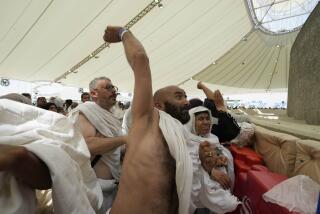Muslims Begin Month of Reflection, Daytime Fasting
- Share via
GARDEN GROVE — The calendar showed that the new moon would appear Tuesday night, but to be sure, Muzammil H. Siddiqi sent nearly a dozen planes above the clouds Monday to search for it. As president of the Islamic Society of North America, the Cal State Fullerton professor couldn’t take any chances.
As it turned out, the moon showed up on time, marking a new month on the Islamic lunar calendar and setting off one of the most spiritual periods of the year for America’s estimated 6 million Muslims--Ramadan.
Starting this morning and continuing until the next new moon is sighted, Muslims will fast from sunrise to sunset, also abstaining during those hours from tobacco use, sex, conflict and impure thoughts. They will gather every evening for communal feasts, prayer and readings from the Koran.
And through the month, as they test their willpower, followers of the prophet Muhammad hope to strengthen their faith and compassion. “A lot of people will tell you at the end of the month, they feel so much stronger or at least in control of themselves,” said Hussam Ayloush of Anaheim.
Ramadan marks God’s revelation of the Koran to Muhammad about 1,400 years ago, according to Islamic belief. The month is a time of spiritual reflection, marked by intensive worship and reading of the entire Koran. It is also a time of giving to charity, purifying one’s behavior and doing good deeds.
“It is a month when we are clearly reminded that there is a spiritual dimension in our being that needs to be nurtured just as we nurture the body throughout the year,” said Maher Hathout, spokesman for the Islamic Center of Southern California.
The timing of Ramadan is based on the lunar calendar--specifically, the sighting of the new moon. The observance begins about 11 days earlier each year.
This year, it comes fast on the heels of Christmas and just as Hanukkah is ending.
The convergence “should be an opportunity to understand and put in perspective our differences and understand our commonalities and try to work for a better future,” Hathout said.
There are times during Ramadan when Eric Ali’s office is filled with tiny sack lunches. For nearly 15 years, he has been administrator at the Al-Madinah School, one of the half-dozen Muslim elementary schools in Los Angeles County.
Though they are not required to fast because of their age, Ali’s young charges get into the spirit, he said, making a child-sized effort to participate in the observance.
And each year, as the day grows long, students at the Los Angeles school find that the spirit may be willing but the flesh gets hungry. The lunches disappear one by one.
“I allow them to take them,” Ali said. ce it.”
Ramadan is also a time for reconnecting with old friends, visiting a number of mosques and other religious centers, and hosting large communal meals.
Times religion writer Larry B. Stammer contributed to this story.
More to Read
Sign up for Essential California
The most important California stories and recommendations in your inbox every morning.
You may occasionally receive promotional content from the Los Angeles Times.













